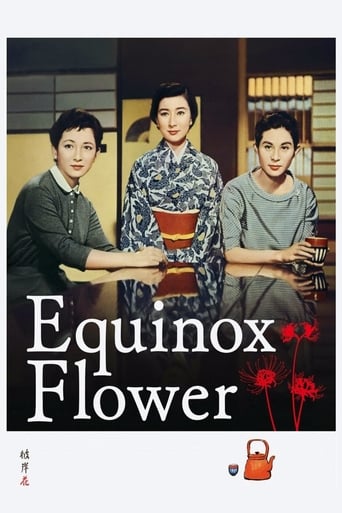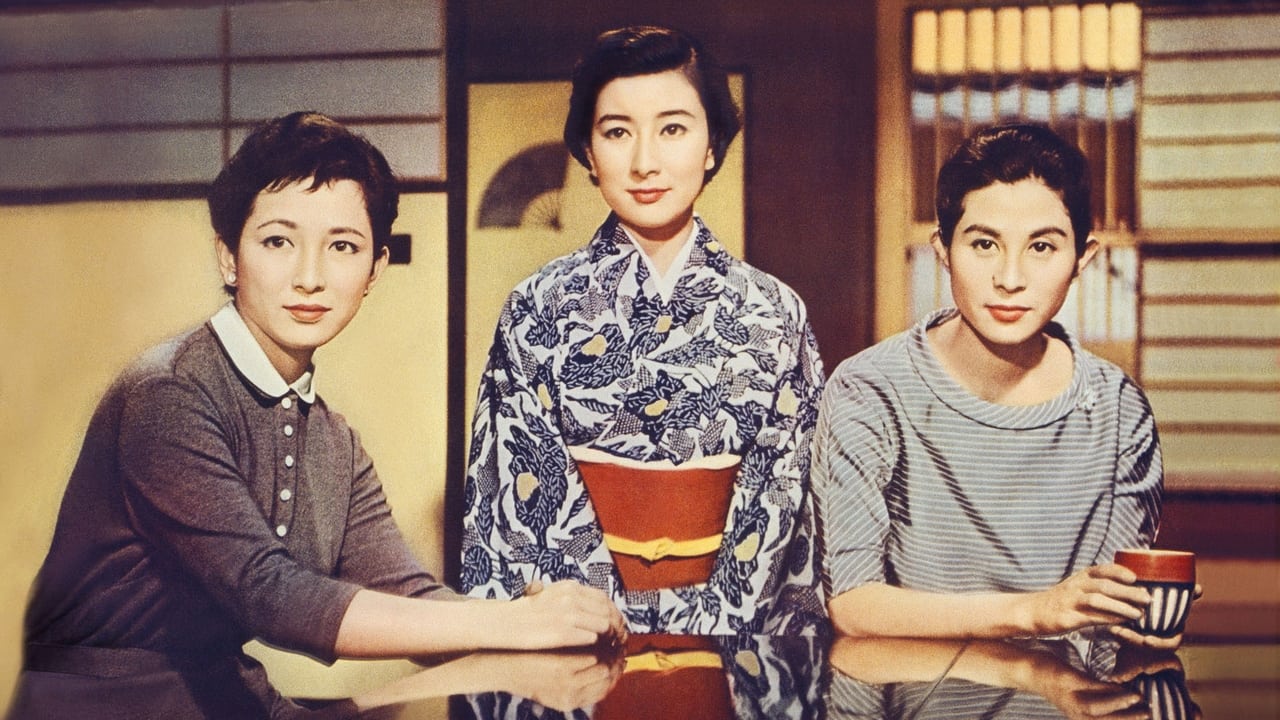tomgillespie2002
Businessman Wataru (Shin Saburi) is continually approached by his friends and co-workers for advice and help, especially when it concerns potential marriages for their daughters. He is approached by Mikami (Ozu regular Chisu Ryu) who is concerned that his daughter has gone off with a man from a lesser family with a low-paid job. He agrees to meet her and try to talk some sense into her. One day at work, he is approached by a man named Maniguchi (Keiji Sada) who asks for his daughter's hand in marriage. Wataru is horrified that his daughter Setsuko (Ineko Arima) has been seeing this man without his knowledge, and insists that marrying him is not the right decision.Japanese master is again on familiar ground with this gentle drama. Again, he explores themes of family, and change in a post-war Japanese society. Wataru is not a traditionalist by nature - he is generally quite open-minded, but only when it comes to his friend's families. When he has tea with one of Setsuko's friends, she explains how her mother is obsessed with finding her a match with a man with a decent job and background. Wataru is agreed that her mother is stuck in her ways. It becomes clear that Wataru is simply a father who cannot let go of his daughter. It's a sentiment that anyone, even those without children, can relate to.Ozu does make a point of showing the increasing differences in attitudes between the generations. The parents are children of war. Wataru and his wife Kiyoko (Kinuyo Tanaka) discuss memories of being in the bomb shelters. Ozu doesn't want us to see the elders as narrow-minded and old-fashioned, but instead as people who grew up with danger and death all around them, and clearly hold protection and security in high regard, and for good reason. However, Ozu does show the women of Equinox Flower as the stronger sex, and the biggest advocates for change. Kiyoko tries to change Wataru's mind, but realises that this is a decision he will make on his own.The film is full of Ozu's usual traits, including the usual gorgeous cinematography - and this is his first to be shot in colour. His camera is ever-still, watching from low angles, usually through doorways. He is offering his audience a window into these people's lives, and allows them to give their naturalistic courtesies as they would if no-one was watching. It is a delight watching a true master at work, and it's amazing how he finds fresh and fascinating ways to explore similar themes. I've never seen any of his films that haven't been anything less than brilliant, and I'm still to see his widely celebrated Tokyo Story (1953). An absolute delight.www.the-wrath-of-blog.blogspot.com
princebansal1982
Equinox Flower like many of Ozu's other movies is about generation gap. But Ozu has a different way of showing the generation gap. There is no black or white, but just shades of gray. Even though the parents or the children may be in wrong on some issue, Ozu still wants us to feel sympathy for them. Instead of fights there are slight admonishments and instead of happy reunions there are reconciliations.A large part of reason for that maybe the Japanese culture in which like many other eastern cultures parents are given more respect. But I think Ozu would have been able to make similar kind of films regardless of which culture he belonged to. This is because his films he films have universal values that strike a chord in everybody.Equinox Flower is Ozu's first color film. He resisted for long time to film in color. But the result here is very good. It is also a relatively more modern film. Sake has been replaced with whiskey and beer. And the younger generation is more openly defiant. He has made a very judicious use of colors.What I love most about his most films is the undercurrent of humor that runs throughout. Even though the topic itself is a little soapy, it never feels like that. I always end up smiling at the end of an Ozu film.
tedg
Ozu is such a pleasure, a quiet one, meditative.The story here is about lives, whether they are arranged and what agency we have in arranging them. Many viewers will suppose that the topic was chosen because of some desire to make a comment about Japanese society.No, its because the filmmaker had turned introspective in his later years. His films are characterized by the way the shots are composed. Each one is a matter of absolute perfection. The perfection is so complete, you have to stop and study. You have to rerun certain scenes to see how amazingly the components arrange. He is the ultimate classical Japanese composer. Sometimes you see that the sets must have been especially built for one setup. Pure geometries and symmetries dominate. The camera is always static.The effect is that what you see has nature. Its natural, human. It flows in much the same languid, undramatic way that life does around us. But what we see is that flow in a highly composed context. Every element in that context naturally occurs but seems to have found its own harmony to please the eye of the viewer. Its the cinematic Japanese garden. There's a subtle thing here. Ordered nature presented so that the human composition seems so in tune with nature that we love it. But it is arranged. It is pure and unnatural too, sort of abstractly sublime.This viewer is a Westerner who works with Japanese concepts of ideal, natural harmony. Watching this makes me cry with a pleasure that avoids being joy.Ted's Evaluation -- 3 of 3: Worth watching.
sharptongue
This is the first Ozu film I've seen, though I did see a film about him many years ago. Therefore, I am aware of Ozu's liking for a particular and eccentric camera angle, and his apparent preference for an acting style which is, depending on your point of view, understated, stilted or highly restricted. Ozu appears to like portraying what is perhaps the reality of a culture which values conformity.Take a tip - adjust quickly to the apparently straightjacketed acting. This is an excellent cast, whose talent shines through even Ozu's iron hand.
And it makes the humour even more effective. I was astonished at just how much I, and the rest of the audience, laughed out loud at a few of the scenes. I find it difficult to simply convey why it works. Suffice to say Ozu is clearly a master of the slow buildup. There's a scene where the father takes one of his employees to a bar, to meet a girl who is the daughter of one of his friends. The girl has run away and cut off contact with her dad. The central character tries to get her to at least talk it over. The humour of this scene revolves around the acute embarrasment the junior employee feels, as a regular patron. Ozu milks this scene for every last laugh with a master's touch. Sounds dull as I've written it, right ? Well, on screen, it's a killer.After this film, I'll look forward much more to my next Ozu.


 AD
AD

